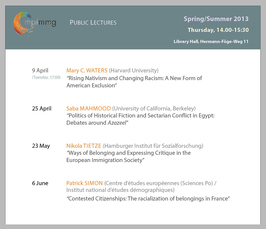"Contested Citizenships: The racialization of belongings in France"
Public Lectures Spring/Summer 2013
- Date: Jun 6, 2013
- Time: 02:00 PM - 03:30 PM (Local Time Germany)
- Speaker: Patrick Simon (Centre d’études européennes (Sciences Po) / Institut national d’études démographiques)
- Patrick Simon is Director of research at INED (Institut National d’Etudes Demographiques – National demographic institute) (F) and research fellow at the Center of European Studies (CEE) at Sciences Po. Trained as socio-demographer at EHESS, he has studied social and ethnic segregation in French cities, ethnic and racial categorizations in an international perspective, antidiscrimination policies and the integration of ethnic minorities in European countries.
- Location: MPI-MMG, Hermann-Föge-Weg 11, Göttingen
- Room: Library Hall

For more details please contact buethe(at)mmg.mpg.de.
France is in the midst of an ongoing debate over what it means to “be French” and how immigrants and their descendents fit into this narrative. The central question revolves around whether it is possible to have what some have called “hyphenated identities” — feelings of belonging to France that coexist with ties to a foreign culture or country. While this is accepted in some multicultural societies (like the United States, Canada or the UK), the idea of having “dual loyalties” has been criticized in France, where identity is perceived as a “zero-sum game”: commitment to a foreign culture or country is seen as detracting from the quality of one’s commitment to France.
The creation of the “Ministry of Immigration, Integration, National Identity and Solidarity Development” and the national conversation on national identity in 2009 have increased the pressure on immigrants’ and second generations’ belongings. While public debates tend to portray feelings of closeness to other countries or cultures as being in competition with French national identity, data from the TeO survey reveal that these two dimensions of belonging are not actually in conflict.
Hyphenated identities and plural allegiances can be conducive to building strong communities. However, this depends on the willingness of the majority to accept newcomers into the national community and it seems that this is not the case for all ethnic minorities. The rise of a double standard citizenship based on “values”, but also ethnicity, race and religion, is curtailing the republican creed of integration by assimilation to the national community. The process of othering and the racialization of French national identity will be discussed with reference to the findings of the TeO survey.